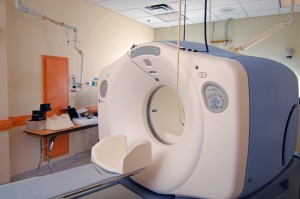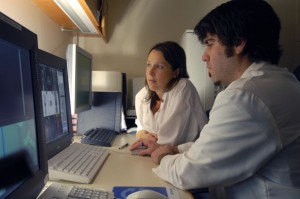Patients undergo different types of scanning procedures to produce detailed images of potential cancer growth. Depending on the cancer, physicians may use MRI, mammography, CT, PET/CT or other technologies.
While some of these procedures use only x-rays or radio waves to create images, a PET/CT scan uses a combination of traditional x-rays and computer imaging. A radioactive substance similar to glucose is given to the patient, and because cancer cells tend to use more glucose than normal cells, PET/CT scans can help detect the biological activity of those cancer cells.
The procedure involves a radioactive substance, but it does not have any side effects and is painless. If you have any questions or concerns about an upcoming PET/CT scan, your care team can answer any questions or concerns.

Before the PET/CT scan
To produce accurate results, patients need to prepare for a PET/CT scan:
- Do not wear clothing with snaps, zippers, buckles, or any other large pieces of metal, and do not wear jewelry. These items could potentially interfere with the scanning procedure.
- Do not eat or drink for six hours before the test and do not suck or chew candy, gum, or lozenges. Plain water, with nothing added, is fine to drink.
- Try to limit physical activity for 24 hours prior to the exam.
- Prescribed medications are fine to take prior to the exam.
- Insulin or oral agents used to control diabetes should not be taken within four hours of the PET/CT scan. Physicians may adjust eating restrictions if the diabetes is diet-controlled.

What to expect on the day of the scan
- The PET/CT scan appointment takes about two hours total, which includes preparation and scan. The PET/CT scan itself typically lasts 30-60 minutes, depending on the imaging needs.
- You can bring your own music player and headphones into the procedure room, which also has classical music available to play.
- You can take prescribed medications such as Valium, Ativan, or other pain medications to reduce anxiety.
- After you check in, a technologist will explain the PET/CT scan, record your height and weight, and answer any questions. The technologist will also take a small blood sample to test blood glucose levels.
- Once the blood is checked, the technologist will inject the radioactive substance into a vein. You will need to rest in a reclined position for 60 minutes before the scan.
- After the PET/CT scan, a radiologist will review the images and send a formal report to the patient’s physician.
For more information on scanning procedures, including other common scans such as MRI, CT, ultrasound and mammography, visit the Dana-Farber Imaging Services website.

Can a pet Scan be used to detect whether Barretts disease of the esophagus may be cancerous or is an endoscope with a biopsy still better for an 84 yr old patient being watched with pre cancer cells from an endoscope 4 years ago? Isn’t an endoscope more invasive and anesthesia a major risk?
Dear Peter,
Thank you for your comment. We recommend discussing this question with a primary care physician.
Best wishes.
I just went through chemo and radiation treatment for squamous cell carcinoma at the base of my tongue and the PET/CT scan came back negative. I’ve been told that the insurance companies won’t pay for follow up checkup PET/CT scans. Has this ever been really pushed by Dana-Farber since this is the only test for this type of cancer? Are there other tests for this type of caner?
I should have stated the last question.. Are there any other type of tests being investigated for this type of cancer?
Thank you..
Dear Jim,
Glad to hear your tests came up negative. We would recommend browsing through our Head and Neck Cancer Treatment Center website as well as the website for our Imaging Services.
We cant answer your insurance question specifically, but please check with your provider if you have any questions or concerns about coverage.
We hope this is helpful. Best wishes to you.
I am just finished with treatment for stage 3c breast cancer. I have bad back pain I have requested a pet scan. I have been told not necessary. Does most BC patients get them.
Hello, Marsha. Sorry to hear about your health troubles. We would recommend discussing your concerns with your physician or care team. Another idea is to seek a second opinion from Dana-Farber or a nearby cancer center. You can also chat with fellow patients through our Dana-Farber Cancer Connect community. Best wishes to you.
Knowing what to expect and what’s expected of you is very important before a scan. You should receive info when you set your appointment, but knowing this beforehand can help plan for it. Thanks for the article!